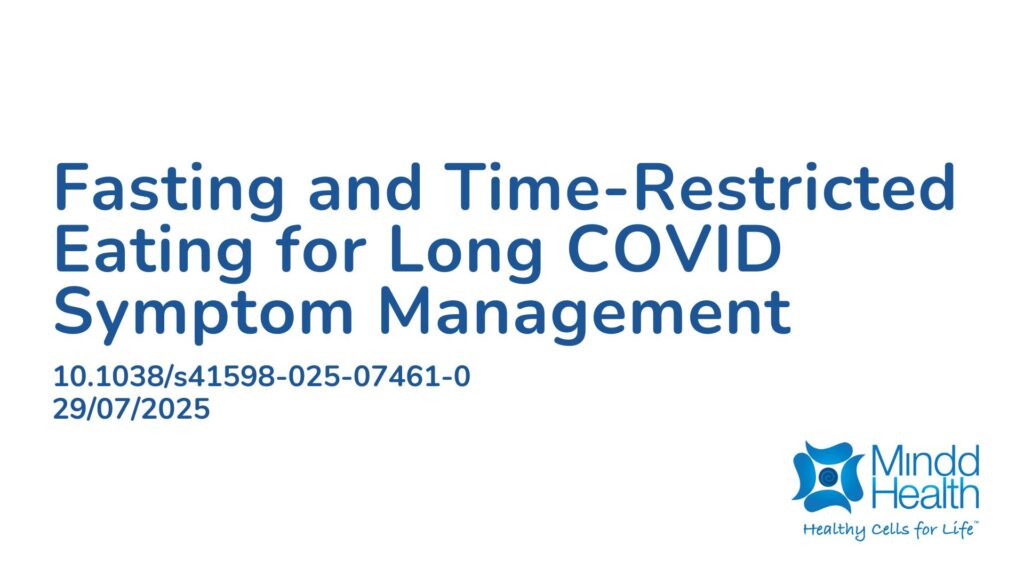Summary:
Long COVID (LC) is a persistent, often debilitating condition following COVID-19 infection, characterised by symptoms such as fatigue, post-exercise malaise, and cognitive difficulties. Its underlying mechanisms remain unclear, though hypotheses include viral persistence, chronic inflammation, and autoimmune responses. Currently, there are no validated diagnostic tests or clinically proven treatments. Fasting, including intermittent fasting and time-restricted eating (TRE), has been proposed as a potential supportive strategy for LC. Fasting can influence glucose and lipid metabolism, mitochondrial function, and oxidative stress, which may enhance cellular repair, antiviral immunity, and reduce inflammation. Early observational studies suggest that periodic fasting may lower the risk of severe COVID-19 outcomes and improve LC symptoms. This randomized 10-week trial compared two dietary interventions in individuals with LC: an intensive regimen of 1-2 consecutive days of fasting per week combined with a 16:8 TRE and no-added sugar diet, versus a milder 14:10 TRE with the same diet. Participants were assigned to one intervention for four weeks before crossing over to the other. Symptoms were tracked weekly using online surveys, measuring both severity and number of LC symptoms. Results showed that both interventions reduced symptoms, but the more intensive fasting regimen produced greater improvements. Over the 10 weeks, the combination of fasting, TRE, and a no-sugar diet decreased LC symptom severity by 52% and the number of symptoms by 41%. No major adverse events were reported. These findings suggest that structured fasting and dietary modification may help alleviate LC symptoms, with more intensive fasting showing superior benefit.
Abstract:
Long COVID (LC) is a common chronic health condition that impairs daily functioning and social connections. This is the first randomized clinical trial to directly compare the effect of two Intermittent Fasting regimens on LC symptoms. The main objectives of this 10-week randomized cross-over trial are to compare the efficacy and safety of 4 weeks of 1–2 day fasting plus a restricted diet vs 4 weeks of mild time-restricted eating (TRE) and a restricted diet in reducing patient-reported LC symptoms. After a 2-week run-in, subjects were randomized to treatment A (TRE) or treatment B (Fasting) for 4 weeks. Subjects then crossed over to the other treatment for 4 weeks. The median fasting duration was 38 h (night-day-night), and the mean duration was 42 h. Symptoms were assessed via weekly online surveys. Primary outcomes were changes in LC symptom severity scores (LC-Scores) and in the number of LC symptoms (numLCsym) between treatments. Secondary outcomes were changes in LC-Scores and numLCsym over the 10-week trial. Fasting was superior to TRE alone in reducing LC-Scores (p = 0.008). The numLCsym decreased − 5.0 during the Fasting 4 weeks vs − 1.4 in the TRE 4 weeks (p = 0.002). Altogether, the 10-week regimen of a no-sugar diet, TRE and Fasting decreased the mean LC-Score by 51.8% (p < 0.0001) from 37.8 to 18.2. Similarly, numLCsym decreased from 20.5 to 12.2, a decrease of 40.6% (p < 0.0001). No major adverse safety events were recorded. Both intermittent fasting interventions decreased symptoms over the 10-week trial but the more intense fasting regimen was significantly better.
Article Publication Date: 29/07/2025
DOI: 10.1038/s41598-025-07461-0



